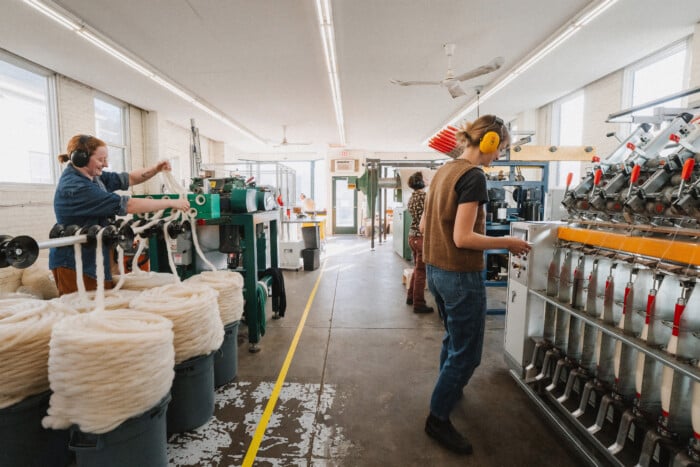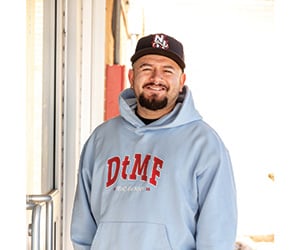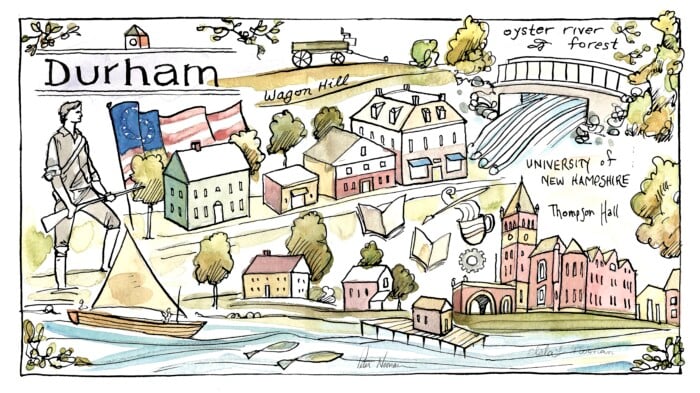Katrina Cruess Hits All The Right Notes
Bedford mom Katrina Cruess is in the business of making sure flutes sound sweet
On a sunny spring day outside the Bedford home of Katrina Cruess, songbirds are chirping in the trees. While they provide a fitting soundtrack for the kind of work Cruess does repairing flutes, the connection between the birds and the woodwind instruments is profound.
A couple of years ago, scientists in Israel discovered seven 12,000-year-old flutes made from tiny bird bones. They were likely designed to imitate the calls of birds of prey, according to Smithsonian Magazine. The bones had finger holes and mouthpieces, transforming them into crude musical instruments.
The flutes that Cruess works on have moving parts, need expert maintenance and cost a lot more than bird bones.
Before she set up Sweet Sounds flute repair at the home she shares with her husband, Dylan, Cruess studied music education and worked for companies that made handcrafted instruments that started at $10,000. Her first gig, in 2013, was working as a “flute finisher” with the William S. Haynes Flute Company in Acton, Mass. Founded in 1888, it’s the oldest flute-making company in the world.
Cruess worked for the company full-time while earning her master’s degree at the University of Massachusetts Lowell, which she completed in 2015.
“You get to play everything you make,” Cruess says. “I ended up making some that were $40,000 that are instruments that I’m not going to own.”
Some were destined for fame and fortune, including with an Irish virtuoso flute player from Belfast.

Cruess holds a ripped flute pad, which has a synthetic suede side and a hard plastic backing. The pads act as seals between the flute’s keys and tone holes.
We were making instruments for professional flute players in orchestras like the (Boston) Pops and orchestras in Europe. We had famous musicians come in; James Galway came in one time. It was really cool to enter that world.”
On this particular morning, Cruess is sharing her workshop with her 7-month-old daughter, Charlotte. Charlotte makes musical sounds all her own in a baby seat while her mother explains how to repair flutes, demonstrating the precision machinery, tools and parts she uses to ensure each instrument leaves her shop in optimal performance shape, whether for a college jazz band or symphony orchestra.
Cruess left her most recent job, making and repairing flutes at Burkart Flutes & Piccolos, in Shirley, Mass., to be a stay-at-home mom for her daughter and her 13-year-old son, Lucas.
“It was a difficult decision to leave a job that I loved, but to be more available to my children is the most important and rewarding thing I could do,” Cruess tells us later over email. “This area is in need of a flute repair specialist, so I’m glad I could fill that void and help my community.”
The Sweet Sounds website reads like an auto repair business, offering “minor adjustments to complete overhauls.”
There’s also equipment that only flute players would be familiar with, such as Straubinger and Pisoni flute pads, which act as seals between the keys and the flute’s tone holes. (They are made to precise specifications from felt and synthetic micro suede.)
New Hampshire Magazine: What is the typical work you do on a flute?
Katrina Cruess: This a flute I’ve already kind of worked on. I’ve replaced all of the pads, but most of the time when I’m work-ing on flutes, it’s a thing called a “clean oil adjust.” That’s what a lot of students will bring in from colleges. I’m basically just taking everything apart, cleaning everything out with alcohol and re-oiling it, and then I’ll make sure that everything closes the way it should close and seal the way it should.
NHM: So, it’s not a user-serviceable instrument. They need a professional, right?
KC: People should get their flutes serviced depending on how much they play. They should get their flute clean oil and adjusted once a year.
NHM: Do you have to get these parts from a specific place that makes repairs?
KC: I actually just got my Straubinger pad certification. It was a three-day online Zoom class. Now I’m allowed to order their pads, and they’re in Indianapolis. There are also pads that you can get from Italy (Pisoni). There’s a couple of different companies in the U.S., but they’re more used on student instruments.
NHM: How long is the process when someone brings in their flute for maintenance?
KC: For a clean oil adjust, it can take a few hours. It really should be in good shape anyway. I’m usually not replacing pads unless they really are ripped. And that’s when I’ll tell the customer ahead of time, “Hey, you have a ripped pad.”
NHM: So, it’s like getting your car work done. You need some brake work.
KC: Yeah, it’s going to cost a little more because of this so that can take a couple of hours, depending on how bad it is. When I’m done with it, I’ll play it in to make sure that whatever I’ve adjusted can settle a little bit. Flutes can change with the weather, such as if you’re leaving your flute in a hot car.
NHM: What flutes are the most expensive?
KC: Probably all gold. Platinum is pretty expensive too. Those are like $50,000.
NHM: How do you handle your pricing? Is it based on the job and how much time it’s going to take?
KC: For student flutes or intermediate flutes, I price a little bit lower than professional-level flutes just because of the materials I use. Student flutes are usually plated, so they’re not solid silver.
NHM: What do you like the most about your work?
KC: I get to check out different instruments, which is the most interesting because when you’re working for a company, you’re only doing flutes from that company. With this business, I get to work on all different instruments … so it’s a lot of problem-solving.














